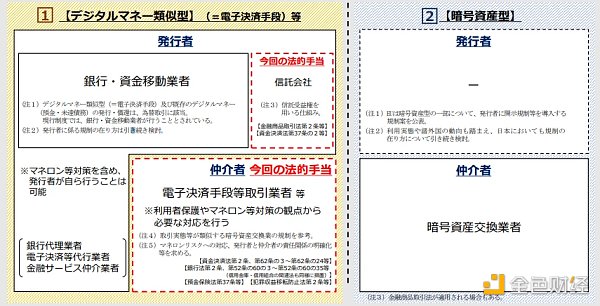What impact will the upcoming legalization of stablecoins have on the market in Japan?
What effect will the legalization of stablecoins have on the Japanese market?Hong Kong is not the only one helping Crypto development from a policy perspective. Just yesterday, Japan implemented the revised “Funds Settlement Act” and defined stablecoins as a new “electronic payment method,” further clarifying the status of stablecoins in Japan’s legal framework and developing detailed rules to regulate the issuance and use of stablecoins in Japan. What changes and opportunities will this policy implementation bring to the market?
Bill Details
Simply put, the revised “Funds Settlement Act” divides digital currencies into “digital currency” and “cryptocurrency” types. The focus of this revision is to separate the former and include stablecoins such as USDT in the “digital currency” type and classify it as foreign exchange trading. Therefore, the issuers of such stablecoins will be limited to domestic banks, transfer service providers, and trust companies, and the new regulations have clearer provisions for issuers and agents. Only agents with electronic payment licenses can participate in the issuance of such stablecoins.
For stablecoins issued overseas, their supervision is mainly completed through agents in Japan. During this period, agents have an obligation to protect customers’ assets, and the Financial Services Agency can require them to provide transfer records for inquiry from an anti-money laundering perspective.
Algorithmic stablecoins are classified as “cryptocurrencies,” and their management methods are the same as other digital currencies. For detailed content of the “Funds Settlement Act,” please refer to the official website link.
- Is the US regulatory agency the reason behind the decline in cryptocurrency trading volume?
- U.S. Digital Chamber of Commerce Blocks Texas’ Anti-Bitcoin Energy Bill
- How LSTFi is Leveraging the $100 Billion Liquidity Collateral Market

Industry Attitude
In fact, several months ago, Japanese banks had already participated in stablecoin-related businesses. On March 2, G.U.Technologies announced that it had partnered with Shikoku Bank, Tokyo Kiraboshi Financial Group, and Minna no Bank to launch stablecoin experiments. Stablecoins were issued on the JaBlockingn Open Chain through its developed management issuance system.
Mitsubishi UFJ Trust announced a technical alliance with Datachain on the 28th of that month and conducted a “PVP payment” experiment to achieve mutual transfer and exchange of various domestic stablecoins issued in the future.
It is not difficult to see that traditional financial institutions are generally open and positive towards new stablecoin regulations and actively cooperate with companies in the Web3 field to explore future businesses in this area. Their participation also provides reliable support and reputation endorsement for the promotion and use of stablecoins in Japan.
Other regions’ latest attitudes towards stablecoins
The US House of Representatives held a stablecoin hearing on May 18, and the Republican and Democratic parties had intense debates on the stablecoin bill. The main point of contention was the regulatory authority of states and the federal government. The Republican bill advocates allowing stablecoin operators to choose to register in any state without going through the Federal Reserve, and each state can freely set its own standards; while the Democratic bill advocates for the Federal Reserve System to play a leading and final decision-making role, and requires issuers to comply with more terms to regulate the industry. The two sides have not yet reached a final consensus.
In addition, the European Union will formulate and implement detailed rules for the implementation of MiCA (EU Cryptocurrency Market Regulations) in the coming months. The rules also propose a series of conditions for stablecoin issuers, including obtaining official licenses and having certain reserve funds. In addition, the President of the European Banking Authority stated last month that “central banks should have the right to veto the widespread introduction of so-called stablecoins,” and “all issuers will be subject to strong authorization and regulatory frameworks.”
Conclusion
The lifting of the ban on stablecoins will bring new opportunities to Japan’s local Crypto market. Stablecoin businesses dominated by traditional finance will undoubtedly be easier and more convenient in terms of regulation and promotion, which also brings new challenges to these institutions. How much impact can the modified law have on the market?
We will continue to update Blocking; if you have any questions or suggestions, please contact us!
Was this article helpful?
93 out of 132 found this helpful
Related articles
- Bankless: What has the market learned one year after the UST crash?
- Bitcoin Virtual Machine BVM is released, ushering in the era of smart contracts?
- Bitcoin Virtual Machine (BVM) is released, ushering in the era of smart contracts?
- 【Exclusive from ChainDD】Russia abandons the plan to build a national cryptocurrency exchange in order to respond to financial sanctions as soon as possible.
- Is the crypto market already on the eve of a bull market? Insights from data on the multi-dimensional BNB Chain.
- Decrypting the Unique Chinese Cryptocurrency Market: Real User Research and a Comprehensive Review of Chinese VC
- Lookonchain: Will the unlocking of 1INCH cause a large-scale market sell-off?






